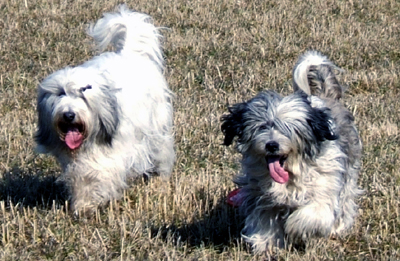
Polish Lowland Sheepdog - pons - pon the dog

Merja Björklund - Kennel Ambergini's Vanilla and Ginni in Sweden
|
A
Swedish health project focusing on diabetes mellitus and hypothyroidism Written by Tove Dahl, DVM, PhD student, Faculty of
Veterinary Medicine, Swedish Several cases of diabetes mellitus and hypothyroidism have been reported
from Polski Owczarek Nizinny (PON) owners in Diabetes Mellitus This disease is
common among humans, dogs and cats. It develops when an animal has a
deficiency of the hormone insulin or when something blocks the effect of
this hormone. Insulin is essential for the cells in the body to get sugar
from the blood. When an animal has diabetes mellitus, it has too much
sugar in the blood and not enough sugar in the cells where it is needed as
the prime energy source. The high sugar level in the blood makes the
animal very thirsty and tired. The diabetic state is dangerous for the
animal and must be treated with daily injections of insulin. The dog is
normally treated initially at a veterinary clinic and then at home by the
owner. As in people with diabetes, some other life-style changes such as
change of diet often need to be performed. A diabetic dog can live a
good-quality life for several years. The causes of diabetes in dogs are
still unclear and probably vary among the different breeds. Hypothyroidism This disease is due
to a deficiency of the hormone thyroxin. Thyroxin normally regulates the
animal’s metabolism. If a dog has a lack of thyroxin, many things in the
body run more slowly. Often the dog gets fat although it eats less. Other
symptoms may be tiredness, slow heart-rate, hair-loss and skin infections.
The therapy is daily oral supplementation with thyroxin. An interesting
aspect is that a diabetic child often gets hypothyroidism
when it gets older. In dogs we don’t know yet if there is such a
connection. Research Project 1.
Health investigation 2.
Blood- and urine samples 3.
Family study International cooperation? It would not be
surprising if PONs in other countries suffer from the same disease
panorama. If you and your
breed union are working with the same diseases and want to share your
experiences, or if you as a PON-owner, breeder or veterinarian are
interested in the project, don’t hesitate to contact the writer of this
article. Results We hope that these
investigations will increase the knowledge about the diseases and also
identify risk factors within the breed. This could improve the
possibilities of an early correct diagnosis and appropriate treatment. If
we find a genetic marker it could be an important step for making the PON
breed healthier. Potentially, such a genetic marker could also be of great
importance in the research about human diabetes and hypothyroidism.
Do you have questions about breed-related health problems (for example hypothyroidism or diabetes)? E-mail the Swedish PON-club: and we will try to answer your questions.
|
ponbreeders/internationalrecipes/faq/swedishhealthdiabetes/socializingchildren/vaccination/ponhoroscopes/dogshownews